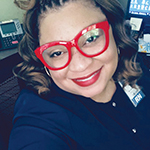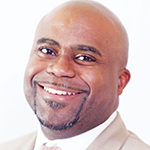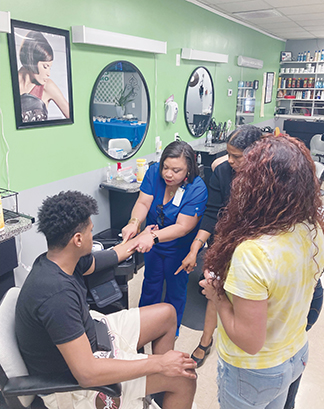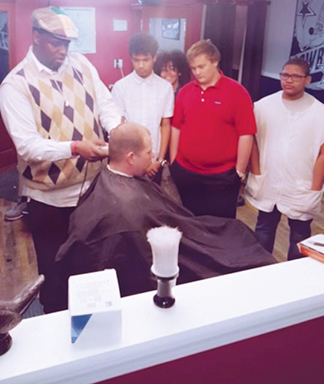By JULIE MINDA
The topics of conversation have been shifting a bit lately at the UpTown Barber Shop near Greenville, South Carolina.
Much more so than in the past, UpTown owner and master barber Timothy "Dreze" Shell and his clients have been talking about heart health, blood pressure, healthy living and mental health.
Shell has been initiating such conversations with clients since earlier this year when he and nearly 20 other Greenville-area barbers and stylists accepted Bon Secours St. Francis Health System's invitation to join its "Beauty and Barbershop Talk" program. Through the program — which is aimed at hair stylists with a predominantly minority clientele — a nurse educator taught the group why and how to discuss health topics with their patrons as well as how to help the patrons take their blood pressure. The group learned to assist clients in seeking care if they need it.
Shell says he's glad the program has given him inspiration and resources to help his customers take better care of their health. "For a lot of guys in today's time, life is really stressful, and their blood pressure can go up," he says. "These guys go through a lot but not all of them go to the doctor. Now, in the comfortable setting of my shop, we can talk about this."

From reflection to action
Brandy McMahand is a nurse and case manager for Bon Secours St. Francis Health System's Healthy Outcomes Program. She says the impetus for the Beauty and Barbershop Talk program came after the
May 2020 killing of a Black man, George Floyd, by a white police officer. The unrest following that death prompted reflection and discussion about race relations nationwide. McMahand says Bon Secours St. Francis Health System President Matt Caldwell
initiated conversations about how the two-hospital subsystem could better address inequities, including around race.

Several ideas rose to the top: building up the pipeline of people of color seeking health care jobs, helping people to manage chronic conditions and advocate for themselves in the health system, and engaging a council of clergy from minority communities in surfacing top health concerns. McMahand and Sean Dogan, a pastor who is Bon Secours St. Francis community health director, have been guiding the work in these areas.
To pursue the goal of helping people manage chronic illness, they initiated a partnership with the American Heart Association. That organization already had begun developing the barbershop program's basics but did not yet have a health system partner to roll it out. Bon Secours St. Francis and the association agreed to together launch the program with Greenville barbers and stylists.
Dogan says the two partners agreed to address through program content some of the conditions that rank highest as concerns on Greenville community health needs assessments. These include heart disease and stroke, which often are caused by hypertension. McMahand notes that nationwide these conditions impact more than half of Black adults and are among the leading causes of death for Black people.
'Trusted place'
McMahand says the Beauty and Barbershop Talk initiative addresses "how to talk about chronic conditions in the African-American community." She says a goal is to reach people of color who may be reticent to interact directly with the health system.
They may be avoiding health care providers because they do not trust them or because they do not want to talk about potentially concerning health conditions. Instead of waiting for people of color to come into the health system, this program aims
to connect with them "in a trusted place."

McMahand says the barbershop and hair salon "are places where African Americans spend several hours at a time and share their lives. They get close to their stylists." She mentions that while other health care providers have worked with barbershops to spread health information in the past, this is the first time Bon Secours St. Francis has done this.
To launch the program, about a year ago McMahand approached barbershops and hair salons in communities with a large population of African Americans. She explained the program and asked them to join.
Those barbers and stylists who accepted her offer took a free class she led about four months ago. She used curriculum developed with the American Heart Association to provide the group with basic information about heart health, blood pressure, sodium and other healthy lifestyle topics. She taught them to use blood pressure cuffs and to interpret the results on a chart. She told them about where they can refer people who need care but who do not have a health care provider, including Bon Secours St. Francis. She provided them with complementary blood pressure cuffs and a binder with basic health information. The American Heart Association had donated some of these materials to the group.
McMahand remains a go-to contact for the group and periodically visits to see if the barbers and stylists have any questions or needs.
Opening up dialogue
McMahand says hypertension and other heart conditions can be silent killers, because they can strike when people have had no symptoms. That's why it's good, she says, that the Beauty and Barbershop
Talk program is opening up dialogue and also placing resources right in the shops. This way people can take action right away — by taking the blood pressure screening in the shop — instead of having to take the time to make an appointment with a health
care provider.

She says the program is too new to have statistically reliable results documented. Anecdotally she has heard from numerous participating barbers that people are welcoming the conversation on healthy living. The clients are agreeing to measure their blood pressure. There have been multiple instances of barbershop and salon customers receiving worrisome results from the blood pressure readings in the shops. McMahand has learned of some customers then seeking out and receiving follow-up care. They've gotten help managing their high blood pressure or other surfaced health condition.
Shell at UpTown says this has been the case for several of his customers. He notes that he and his clientele also now feel comfortable talking about other health concerns more openly. As a result of such conversations a shop customer sought help for depression. Customers have thanked Shell for helping them get the care they need.
Bon Secours St. Francis already is expanding the barbershop program. McMahand in mid-May trained a new group of barbers and stylists for the program — that group has clientele who are predominantly Hispanic.
Bon Secours St. Francis is helping a Bon Secours Mercy Health campus in Richmond, Virginia, to evaluate the program for possible launch there.
Dogan is encouraged to see Beauty and Barbershop Talks spread. He says the program "is important because it's actually an opportunity for people to take control of their health and not wait until something happens" to get care.
He says, "if it's important to do self-care and pamper yourself at the salon, why not look wonderful on the outside and be wonderful on the inside too?"
